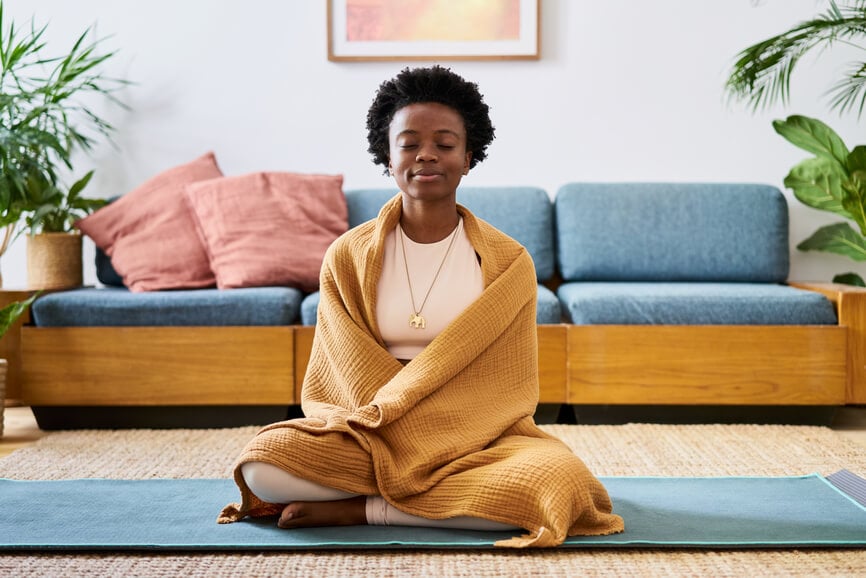Why do we feel bad about self-care, and what does self-care truly mean? Is it a material good, is it an experience, or a feeling? Well, to start, self-care is the belief that one cannot adequately take on the problems of others without taking care of oneself. True self-care is figuring out what works for you, and honoring what your needs are, and working within your limits (Aisha Harris, 2017). So, why do we feel guilty about it?
In a study, 75% of survey respondents reported feeling guilty after spending on themselves. But women seemed more prone than men to buyer’s remorse: Sixty percent of women surveyed admitted that they felt guilty after buying material items, while under half (47%) of men did (Marketwatch, 2018). So, how can we go about addressing this, and why is this?
We’re taught that we have to deserve self-care.

Because we live in a society that values output over everything, we are often taught that we have to accomplish a certain level of production to deserve relaxation or nice things. Have you ever been hesitant to express that you’re tired, frustrated, or having a difficult mental health day because you’re apprehensive about how people will respond? Maybe they’ll say things like, “Didn’t you just take off of work?” As a result, you might feel like you don’t deserve to be tired or that you haven’t worked hard enough to be tired. Likewise, you ask yourself, “Do I deserve self-care?”
These types of ideas around self-care can result in feelings of inadequacy and burnout. Burnout is a feeling of, “What’s the point?” It can result from feeling like you’re working so hard but never getting ahead. Burnout can also result from a lack of reward and pleasure in your life.
So, it’s good to carve out time for self-care because self-care is about more than just a reward. It’s about validating how you feel whether it’s exhaustion or frustration. We are not objects of production, and our humanity deserves to be acknowledged, especially in the instance that we are feeling discomfort or distress. No one should have to earn their humanity, right? So, if someone needs a break or self-care, it shouldn’t be a question of deservingness. If you need a break, you need a break. Period.
Another thing is this. Don’t think you have to be on the brink of exhaustion to rest or reward yourself. Self-care is an act of constant maintenance. It doesn’t always have to be a reaction to feeling overwhelmed or under the weather. Self-care is habit-oriented and a day-by-day routine.
We’re comparing our self-care experiences to others.

Oftentimes, people display their self-care on social media, and we might compare the things we do for our own self-care to others. Maybe we see a picture of someone dressed up hanging out with a bunch of friends at a fancy dinner, and we think to ourselves, “Wow, should I go out more and have fun?” If that is not your idea of self-care, you don’t have to conform to it. Also, self-care doesn’t always have to be luxury. Within your boundaries, self-care is whatever makes you feel relaxed, safe, and happy. Yes, it can be a high-end, international beach trip, but it can also be snacks, pajamas, and your favorite Netflix series. It’s the feeling you get from self-care that counts, not the regard from others. Self-care is measured in comfort and happiness.
Our mood drops after purchase, and we’re left feeling like we need more.
:max_bytes(150000):strip_icc()/fb-woman-eating-alone-c79afdfff74a4272838d183caaff4c20.jpg)
A 2014 study from the Journal of Consumer Psychology describes how “retail therapy not only makes people happier immediately, but it can also fight lingering sadness.” For example, going into a favorite store or even logging into its website can signal your body that it should start producing greater amounts of dopamine, a neurotransmitter, in the brain.” However, that release can make you keep shopping in search for pleasure and reward says Darren Bridger, a London-based consultant at Neurostrata, a neuromarketing research firm(Cleaveland health, 2021).
Things like shopping or even smelling cookies baking in the oven can all trigger dopamine release or a "dopamine rush." This feel-good neurotransmitter is also involved in reinforcement. That’s why, once we try one of those cookies, we might come back for another one (or two, or three)" (Harvard Health, 2021).
However, after shopping, what might happen when these feelings wear off? We might not feel as happy or good, and we could want to come back for more. In this case, it can be helpful to do activities that offer us self-care from within. While there is nothing wrong with treating yourself, it’s important to find hobbies or activities that make us happy too like meditation, enjoying time with friends, relaxing in the house, or a favorite meal.
You can also try to have a fun experience rather than outright purchasing something. If your mood drops after you haven’t been shopping for a while, you can try indulging in an experience like a hike, concert, comedy show, or a poetry slam. Even though this might require a fee, it can add a pause to constant cycles of purchasing things.
Ultimately, self-care is something that you should always take the time for, and it’s something you can embrace in a vast multitude of ways.

